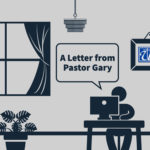
Some years ago an agriculture professor in my congregation invited me to open the convention of the National Seed Analysts convention with a devotion. The convention was meeting in our city.
When this was first mentioned, I had never before heard of a seed analyst. A cartoon picture immediately popped into my mind of a kidney bean shaped seed laying on a couch with another similarly shaped seed sitting on a chair next to the couch with a pad and pencil in hand. The one in the chair was saying to the one on the couch, “Tell me about your father.”
I discovered that is not at all what a seed analyst is. In fact, I learned there are seed banks around the country preserving and protecting seeds in the event of some catastrophe natural or human caused.
There is a reason analysts, however, do sometimes ask about one’s father or mother; that is, about one’s past. How one got to where they are is a result of the people, places, and events of their past as well as many of their past decisions. The past is how we got to our present.
Currently there are many who seem fearful about teaching of our past in school….that is, of our past in its entirety. Why should a nation or culture fear talking about negative parts of its past? Why be uncomfortable revealing the darker side? Is there anyone who does not have things in their personal past of which they are not proud? Have any of us not ever harbored some darker thoughts or done or said something to cause harm to another?
There is a reason history is studied. It is not because we find it interesting, it is because we need to discover what has worked and what has gone wrong. We need to learn from the past which has brought us to where we are today. We need to confront it, deal with it, change it, and move forward. In fact, failure to address the negative in one’s past robs healing of its fullness.
In the Christian faith we call this repentance. Martin Luther described the Christian life itself as a life of repentance. Those who believe new life can emerge from that which is dead can embrace and welcome repentance, acknowledging the wrongs of the past so as not to repeat or exacerbate them now and in the future.
One of the things we need most confront is why certain issues seem to press such volatile buttons in us. If race and racism is not such a big deal, why can it so easily enflame us? If we are not threatened about issues of sexuality and gender, why does volume seem to increase in discussing such?
It boils down to this: why are people of God, assured of God’s love and forgiveness so uncomfortable and insecure about delving into those areas of our personal and national past? Discomfort is one thing. Insecurity and inability to deal with such important and divisive issues is another. Can we find faith enough to risk saying and doing the wrong things? Can we find faith enough to have others teach us of the errors of our ways so we can repent and change them? Why must we remain so unreflectively convinced of just how right we are and convinced our attitudes and ourselves are never in need of reform?
One of the Reformation insights was that the state of the church is to be in a constant state of Reformation.” Ecclesia reformanta semper reformanda” was one of the Reformation’s several mantras; the church reformed, always reforming. Can we apply this slogan to ourselves? To our nation and world? Only by acknowledging where we were and who we now are. Dare we be honest both with God, each other, and, perhaps most dangerous of all, to ourselves? It is a good way to avoid needing an analyst.
